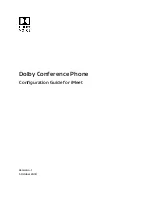
D15107.05
Codec SX80 API Reference Guide TC7.3, OCTOBER 2015.
Copyright © 2015 Cisco Systems, Inc. All rights reserved.
19
Cisco TelePresence SX80
API Reference Guide
Example 1:
Microphones Mute status.
Terminal query
xStatus Audio Microphones Mute
*s Audio Microphones Mute: Off
** end
Equivalent feedback expression
xFeedback register /Status/Audio/Microphones/Mute
Example 2:
Name of all video input connectors.
Terminal query
xConfiguration Video Input Connector Name
*c xConfiguration Video Input Connector 1 Name:
“NameA”
*c xConfiguration Video Input Connector 2 Name:
“NameB”
*c xConfiguration Video Input Connector 3 Name:
“NameC”
*c xConfiguration Video Input Connector 4 Name:
“NameD”
*c xConfiguration Video Input Connector 5 Name:
“NameE”
** end
Equivalent feedback expression
xFeedback register /Configuration/Video/Input/
Connector/Name
Example 3:
Name of video input connector 3.
Terminal query
xConfiguration Video Input Connector 3 Name
*c xConfiguration Video Input Connector 3 Name:
“NameC”
** end
Equivalent feedback expression
xFeedback register /Configuration/Video/Input/
Connector[@item=’3’]/Name
Feedback mechanism
To build solutions that can reliably keep the state between the
application and the codec synchronized, you need to set up
a notification system to report the changes in the state of the
codec.
The API supports notifications on the following:
• Configuration changes
• Status changes
• Event notifications
These notifications will not be sent unless the user has
explicitly told the codec to do so. The user is required to
subscribe to all the feedback the application needs. This
is done by registering feedback expressions. The way of
registering feedback expressions varies according to the
connection method used.
When using HTTP, the method of handling feedback
differs slightly from what is presented in this section. See
”Feedback from codec over HTTP” on page 22
for more
information.
Feedback expressions
The expression used when registering for feedback is a
variant of the XPath language. This language describes a
way to select nodes from an XML document. TC software
contains three main feedback documents:
The syntax for feedback registering is:
xFeedback register
<path>
Never register for all status feedback by issuing
xFeedback register /Status.
It is safe to register for all configuration changes using
xFeedback register /Configuration, as configuration changes
will most likely not occur that often.
By going through some examples, we can see how this
information can be used to build feedback expressions. A
good way to verify the expressions is to point your browser
to
http://<ip-address>/getxml?location=path
or to execute
xgetxml <path>
from the terminal, and check that the output
matches the nodes you want feedback on.
WARNING:
A codec may give very much feedback,
especially when calls are connected and disconnected.
Therefore, you should only subscribe to the feedback that
you need.
Never register for all status feedback by issuing
xFeedback register /Status. This may give the control
application too much data to handle, which may lead to
sluggish or unpredictable behavior.
Document
API command
Path
Status
xStatus
/Status
Configuration
xConfiguration
/Configuration
Event
xEvent
/Event
Contents
Introduction
About the API
xConfiguration
Appendices
xCommand
xStatus
About the API
















































